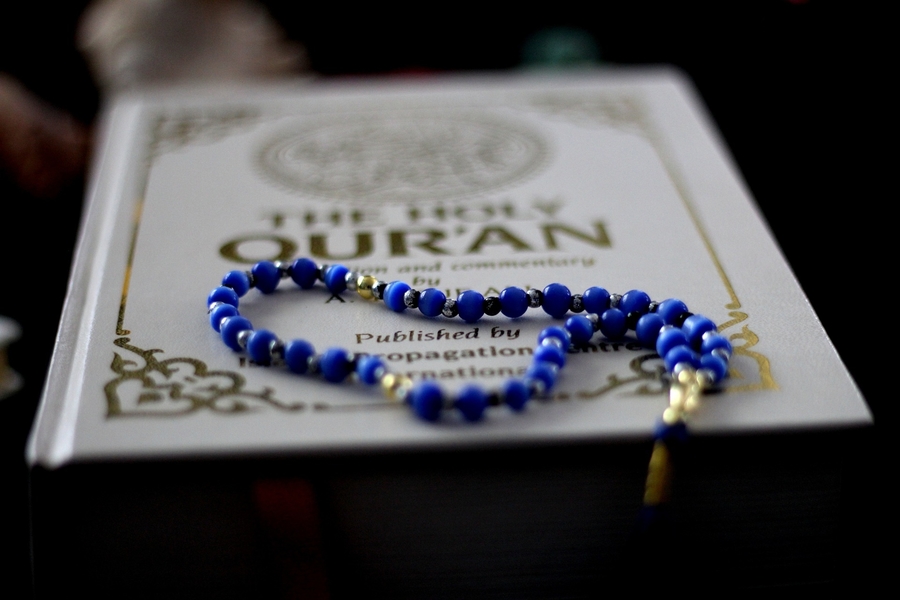Yusuf was the son of Prophet Yaqub (Jacob AS), who was the son of Prophet Ishaq (Isaac AS) who was the son of Prophet Ibrahim (Abraham AS). The Quran itself says the story of Yusuf (AS) is the best of stories that is related to Prophet Muhammad (SAW).

Prophet Yusuf is well known in history and the Quran includes an entire chapter on his life and struggles. There are numerous lessons to be learned including his relationship with his father and siblings, how you can overcome adversity through trials, how to be steadfast when tempted and how to behave when you finally succeed.
The difference between this Surah and others is that it is one full story from start to finish and in chronological order of one individual – Yusuf (AS). There are no snippets of this story in other Surahs.
Benefits of reciting Surah Yusuf
One of the benefits of reciting this Surah is that it softens your heart quickly when reading and contemplating over it. This Surah was revealed when Prophet Muhammad (SAW) was exiled by his people and he faced even more hardship, but he found hope in the Surah.
When someone mentions the name Yusuf, the first thing that comes to mind is beauty i.e. someone who is very good looking. Prophet Yusuf (AS) after whom the name is given had the beauty from outward appearance and also inner beauty within.
He had a most noble lineage, being the son of Prophet Yaqub (Jacob AS), who was the son Prophet Ishaq (Isaac AS) who was the son of Prophet Ibrahim (Abraham AS). The Quran itself says the story of Yusuf (AS) is the best of stories that is related to Prophet Muhammad (SAW) who was before this, unaware.

Lessons from Surah Yusuf
1. Have a good Father and Son relationship
‘(Of these stories mention) when Joseph (Yusuf) said to his father, “O my father, indeed I have seen (in a dream) eleven stars and the sun and the moon; I saw them prostrating to me.’
Quran [12:4]
The first beautiful lesson we learn from this Surah is the relationship that Yusuf had with his father Yaqub when he told his father about a dream that he had. He visioned some important event and he relates it to his father. This shows they had an open, trusting understanding between father and son. How many children have a relationship like this with their fathers? Many times a father is not there much for their child’s upbringing and when the child grows up and makes decisions for themselves which the father isn’t approving of, the father complains. If only you were there to guide your child correctly and participate when he was growing up.
2. The Envious Eye is real
‘He said, “O my son, do not relate your vision to your brothers or they will contrive against you a plan. Indeed Satan, to man, is a manifest enemy.’
Quran [12:5]
When we talk about Surah Yusuf, we talk about beautiful things. In this day of social media where we put things up for the whole world to see, we should be careful of who we share our beautiful things with because in the eye there is envy. You may have acquired something so quickly and easily. The person who sees what you have may have been striving and tiring to get that very thing without success. You think he is going to share your happiness? There appears a natural but harmful thing as jealousy. This is what Prophet Yaqub (AS) was worried about for Yusuf (AS). Yaqub feared that if Yusuf narrated his vision to any of his brothers, they would envy him and conspire evil plots against him.
In a hadith, Prophet Muhammad (SAW) said: ‘Earn help for fulfilling needs by being discrete, for every owner of a blessing is envied.’
An interesting point appears here about Yaqub’s (AS) upbringing of his other children, some of whom decided to kill Yusuf due to their jealousy, was there negligence by Yaqub in fulfilling his responsibility correctly with them? Being a nabi (Prophet), he was always fair to all his children and gave them the best upbringing. However, this story does show that despite this, you, as a father will still face challenges in regards to your children and Allah sends these as a test for you to see how well you react in this situation.

3. You can reach new heights straight after a setback
Due to their jealousy of thinking that Yaqub loved and favoured Yusuf above them, the brothers decided to kill Yusuf or cast him out to some other land, hoping that their father’s favour would then be on them. However, their plot to kill Yusuf would not have succeeded, because Allah willed that Yusuf fulfil a mission that must be completed. He would receive Allah’s revelation and become His Prophet. He willed Yusuf to be a powerful man in Egypt and govern it. When they threw Yusuf down the well, what must have been going threw his young mind? Did he know all these things were about to happen to him? This was the start of the master plan.
Similarly when we face a setback or major upheaval in our lives, rather than becoming dejected and despondent, we should think of this beautiful story about how Allah protected and elevated Yusuf (AS) from the depths of the well to his position many years later. Many times, a negative event is the very thing that spurs and begins a time of great effort and eventual success. We turn to Allah in our good times and our low points, we put our trust in Him, knowing it is part of His plan. So we start again, strive again and have patience. It could take many months or years to recover but insha’Allah it will happen. It took 20 years from Yusuf (AS) being thrown in the well to being so important in the land. In some narrations it mentions 40 years.
4. Your own children can lie to you
When the brothers had hatched a plan to convince their father to let Yusuf go with them, Yaqub (AS) had an ill feeling and told them how it saddens him that they should take Yusuf away. We as parents today should also have such a relationship with our children that we know when they are lying because children can and do lie to their parents. This could be for something they did wrong but knowing what our reaction would be, they blame someone else instead or say somebody else started it. It is usually seen that instead of questioning and probing for the right information, we take our children’s word straight away, especially against others outside the family. This isn’t always the right course of action to take.
Despite his fears, Yaqub let Yusuf go with his brothers because he gave them the benefit of the doubt. When they had actioned their plot and came back to Yaqub to tell him what happened, they lied again. Look at what Yaqub’s (AS) reaction was with them even after knowing they were lying. He still maintained a good relationship with his sons; he didn’t disown them or turn them out. He cried out to Allah for help, in fact he cried so much that, in some narrations, he lost his eyesight. He didn’t cry due to losing his child and asking why this happened, but asking Allah to look after Yusuf, protect him and care for him in the best manner.
5. Reject sin to keep your blessings
One of the most important parts of this story is to inform people how barakah (blessings) are obtained. When Allah’s plan was coming to fruition, Yusuf had grown up and had everything: he had looks, power, fame, intelligence and honour. When the minister’s wife tried to seduce him with lust, it was his rejection of this sin that Allah presents. This shows how one acquires and keeps barakah in your wealth and honour – to reject sin when it tries to seduce you.
What stopped Yusuf from falling into sin? It was Allah. Falling into sin is a sure fire way to stop blessings showering you. To get goodness in this world, you need to obey Allah, we may falter sometimes, being human, but we keep trying and turning towards him because time is limited for all of us in this world.
More Lessons of Surah Yusuf
There are so many more lessons to be derived from this Surah. In a quick bulleted list some of these are:
6. Yusuf (AS) would rather go to jail than disobey Allah and having his reputation sullied
7. When in jail, he still beamed positivity and didn’t lose hope in Allah’s help. He didn’t become depressed.
8. Even in such negative circumstances, Yusuf (AS) still didn’t lose the opportunity to spread the deen (religion) and love of Allah to his cellmates, who were worshipping other than Allah at that time
9. When it was time to remain silent, he stayed silent. But when it came time to speak, he made his speech loud and clear, such as when he was about to be set free. He first made sure his reputation was restored and made clear that people were lying about him. This shows that if you are truthful, Allah will surely give you a time to have your case heard.
10. When he had risen to the top, Yusuf (AS) was still humble. He reminded his brothers of their crimes and could have punished them but he forgave them. He only spoke about things that were positive.
11. He informed of a great lesson by saying whoever has taqwa (fears Allah) and patience, Allah will not allow to be lost the reward of their good deeds.
May Allah help us appreciate the endless and boundless beauty of Surah Yusuf.



